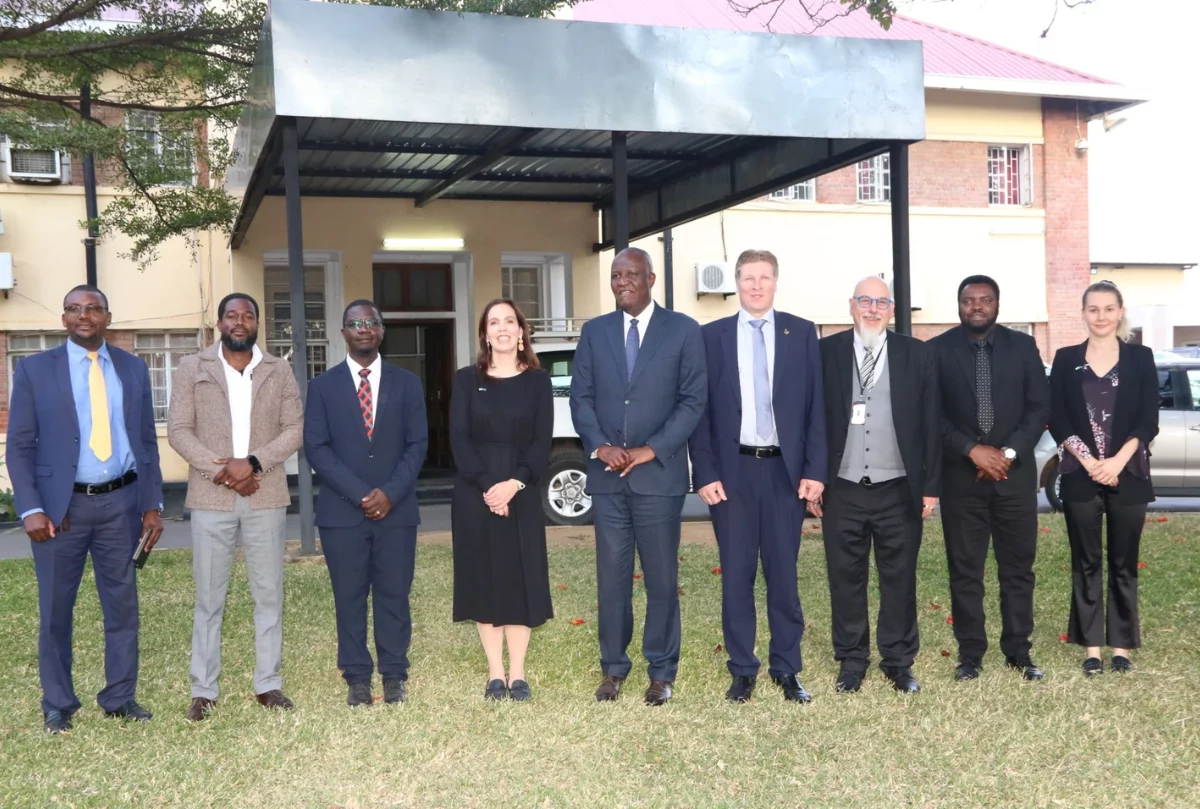Zambia faces significant challenges in healthcare delivery, particularly in rural and underserved areas, due to limited infrastructure, a shortage of skilled healthcare professionals, and geographic barriers. With a population of over 20 million spread across 10 provinces, ensuring equitable access to quality healthcare is a priority for the Zambian government. The integration of Artificial Intelligence (AI) and digital technologies has been identified as a transformative solution to bridge these gaps, aligning with Zambia’s National AI Strategy (2024–2026), which emphasizes AI-driven innovation in sectors like healthcare.
On June 20, 2025, Zambia’s Ministry of Technology and Science, in collaboration with the Ministry of Health, launched a nationwide pilot program to test AI-driven remote diagnostic tools and pharmacological analysis. This initiative builds on Zambia’s earlier steps toward digital health transformation, including the adoption of remote diagnostics technology by Finnish company 73Health in January 2025. The pilot is supported by the Finnish government and leverages Zambia’s growing digital infrastructure, including satellite connectivity provided by Paratus Zambia, the official Starlink distributor.
Objectives
The primary objectives of the pilot program are:
- Enhance Healthcare Access: Deliver high-quality medical services to remote and underserved communities through AI and telemedicine, reducing the need for patients to travel long distances.
- Improve Diagnostic Accuracy: Utilize AI-driven tools for precise and timely diagnoses, particularly for complex conditions requiring specialist input.
- Ensure Patient Safety: Implement AI-based pharmacological analysis to prevent adverse drug interactions and ensure safe administration of medications.
- Test Scalability: Evaluate the feasibility of deploying AI and remote diagnostics across 20 health posts in all 10 provinces to inform a potential nationwide rollout.
- Strengthen Zambia-Finland Collaboration: Leverage Finland’s expertise in digital innovation to support Zambia’s healthcare transformation and foster long-term partnerships.
Implementation
The pilot program is being implemented across 20 health posts in Zambia’s 10 provinces, ensuring representation from both urban and rural areas. The initiative integrates two key technologies:
- 73Health Global’s Remote Diagnostics Technology: Developed by Finnish company 73Health Global, this technology enables doctors to conduct medical examinations remotely with high accuracy. It is already in use in Finland, China, and Canada, and its deployment in Zambia marks its expansion into Africa under the 73Health Africa initiative.
- Larry RX AI: A Zambian-developed AI tool designed to analyze drug-to-drug interactions and ensure compliance with safe medication practices. This homegrown solution enhances patient safety by reducing the risk of adverse drug reactions.
The pilot is supported by robust digital infrastructure, including:
- Connectivity: Paratus Zambia, the official Starlink distributor, provides satellite-based internet to ensure reliable communication between remote health posts and central medical facilities.
- Cybersecurity: The program emphasizes strong cybersecurity measures to protect patient data, aligning with Zambia’s focus on trust and confidence in digital systems as outlined in its National AI Strategy.
Stakeholders
The initiative involves a multi-stakeholder partnership:
- Zambian Government:
- Ministry of Technology and Science: Leads the pilot, aligning it with Zambia’s AI Strategy and digital transformation goals. Minister Felix Mutati has been a vocal advocate, emphasizing technology’s role in enabling one doctor to serve multiple locations simultaneously.
- Ministry of Health: Oversees the integration of AI tools into healthcare delivery and ensures alignment with national health priorities.
- Finnish Government: Provides financial and technical support, building on decades of cooperation with Zambia in private sector development and innovation. Finnish Ambassador Saana Halinen highlighted Finland’s global leadership in digital innovation and its commitment to African development partnerships.
- 73Health Global: A Finnish health tech company supplying remote diagnostic technology and expertise. Board Chair Yaakko Seppälä emphasized the mission to make healthcare accessible and affordable through AI and telemedicine.
- Pentatech Ltd: A Zambian tech company collaborating on the deployment and integration of AI tools.
- Paratus Zambia: Ensures reliable connectivity through Starlink’s satellite network, critical for telemedicine in remote areas.
- Larry RX AI: A Zambian innovation contributing local expertise in pharmacological analysis.
Key Features of the Pilot
- Telemedicine and Virtual Consultations: Patients in remote areas can consult specialists from Zambia and abroad (e.g., India, Europe, South Africa) via video conferencing, instant messaging, and virtual platforms, reducing the need for in-person visits.
- AI-Driven Diagnostics: The 73Health technology uses machine learning to analyze medical data, enabling accurate diagnoses for conditions like diabetic retinopathy and tuberculosis, as demonstrated in prior Zambian studies.
- Pharmacological Safety: Larry RX AI analyzes drug interactions to ensure safe prescribing practices, addressing a critical need in Zambia’s healthcare system.
- Rural Outreach: The pilot prioritizes underserved communities, aiming to eliminate barriers to healthcare access and reduce reliance on medical tourism.
- Data Security: Robust cybersecurity measures protect patient data, fostering trust and encouraging investment in Zambia’s digital health ecosystem.
Expected Outcomes
The pilot is expected to deliver several benefits:
- Improved Access: Patients in remote areas will receive timely, high-quality care without traveling long distances, reducing costs and improving health outcomes.
- Enhanced Efficiency: AI tools will enable healthcare providers to manage larger patient loads, addressing the shortage of skilled professionals.
- Cost Reduction: By leveraging technology, the pilot aims to lower healthcare delivery costs, making services more affordable.
- Scalability Insights: The pilot will provide data on the feasibility of scaling AI-driven healthcare solutions nationwide, informing Zambia’s long-term digital health strategy.
- Global Recognition: The initiative positions Zambia as a leader in AI-driven healthcare in Africa, alongside countries like Rwanda and Nigeria, and strengthens its partnership with Finland.
Challenges and Considerations
While promising, the pilot faces several challenges:
- Infrastructure Limitations: Despite improvements, unreliable power supplies and connectivity in some rural areas could hinder implementation. The reliance on Starlink and fiber optics aims to mitigate this, but scalability remains a concern.
- Workforce Capacity: Training healthcare workers to use AI tools effectively is critical. The pilot must address potential resistance to technology adoption among staff.
- Data Privacy and Ethics: Ensuring patient data security and ethical AI use is paramount, particularly given global concerns about AI misuse, such as misinformation or bias in algorithms.
- Cost and Sustainability: While the pilot is supported by Finland and private partners, long-term funding and maintenance of AI systems could strain Zambia’s healthcare budget.
- Equity: Ensuring that the benefits of AI-driven healthcare reach all communities, including marginalized groups, requires careful planning and monitoring.
Context and Broader Implications
The pilot aligns with Zambia’s National AI Strategy, launched in November 2024, which prioritizes AI-driven solutions in healthcare, agriculture, and public services. Zambia is among the few African nations with a dedicated AI strategy, supported by partners like Finland and the Tony Blair Foundation. The strategy emphasizes five pillars: connectivity, reliable data, trust and confidence, innovation and entrepreneurship, and partnerships.
The initiative also builds on prior AI healthcare successes in Zambia, such as the use of the Delft Institute’s CAD4TB software for tuberculosis detection and AI-driven diabetic retinopathy diagnosis, which showed promising results compared to human assessments. These precedents underscore Zambia’s potential to lead in digital health innovation in Africa.
Globally, the pilot contributes to the growing adoption of AI in healthcare, particularly in low- and middle-income countries. It aligns with efforts in Rwanda, Nigeria, and Ethiopia, where AI is being used for disease surveillance, diagnostics, and supply chain management. The Zambia-Finland partnership exemplifies how international collaboration can drive sustainable development, leveraging Finland’s innovation ecosystem to address Zambia’s unique challenges.
Conclusion
Zambia’s AI-Driven Remote Health Pilot, launched on June 20, 2025, represents a significant step toward transforming healthcare delivery in the country. By combining Finnish expertise with Zambian innovation, the initiative addresses critical gaps in access, efficiency, and patient safety. While challenges remain, the pilot’s focus on scalability, equity, and data security positions it as a model for AI-driven healthcare in Africa. Successful implementation could pave the way for a nationwide rollout, reinforcing Zambia’s leadership in digital health and deepening its partnership with Finland.




